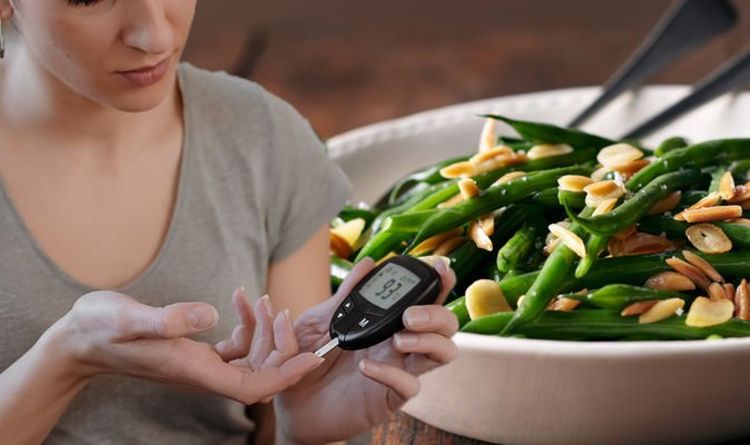Type 2 diabetes can be a 'devastating diagnosis' says expert
We use your sign-up to provide content in ways you’ve consented to and to improve our understanding of you. This may include adverts from us and 3rd parties based on our understanding. You can unsubscribe at any time. More info
Type 2 diabetes is a chronic condition whereby the body does not produce enough insulin or the insulin it does produce is not taken up by the cells. The primary role of insulin – a hormone secreted by the pancreas – is to regulate blood sugar levels. Stripped of this regulating mechanism, blood sugar levels can rise to dangerous levels.
Fortunately, you can lower high blood sugar levels by modifying your diet and certain items are more effective than others.
Mounting evidence suggests consuming garlic on a daily basis can help to reduce high blood sugar levels.
One notable study is published in the Feyz Journal of Kashan University of Medical Sciences, an international Open access, Peer-reviewed journal.
The three-month randomised and double blind clinical trial was conducted on 60 new cases of type 2 diabetes referred to the diabetes centre of Kashan.

A double blind trial is a trial where neither the researchers nor the patients know what they are getting.
The effect of garlic on their blood sugar and HbA1C (your average blood glucose (sugar) levels for the last two to three months) was assessed.
Thirty patients were given two tablets of garlic three times per day (each tablet containing 400 mg dry garlic powder and over 1000mg Allicin) and 30 patients (controls) received vitamin B1 tablets.
Both groups were given the same diet and exercise programs.
DON’T MISS
Diabetes: The yellow drink that causes high blood sugar to plummet [TIPS]
Cancer: The fish that’s ‘known to cause cancer’ when eaten [ADVICE]
Supplements: The vitamin that can prove ‘fatal’ – NHS warning [INSIGHT]
What did the researchers find out?
After three months, the garlic-treated group showed a “significant reduction” (49.5 mg/dl) in fasting blood sugar when compared with the control group, the researchers wrote.
“Garlic significantly reduced FBS [fasting blood sugar] and HbAlC in type 2 diabetic patients,” the researchers concluded.
They added: “Hence, it may be a candidate drug in the treatment of diabetes mellitus.”
Health bodies also attest to the blood sugar-lowering benefits of eating garlic.

Diabetes.co.uk says: “Although the research recommends using garlic for reducing blood sugar levels only under the guidance of your doctor, it could provide a range of benefits for diabetics in conjunction with their usual treatments of insulin and diet.”
The health body continues: “It is know that garlic contains more than 400 chemical components, many of which can help prevent and treat a diverse range of health problems, but it is compounds including allici, allyl propyl disulfide and S-allyl cysteine sulfoxide that raise insulin levels in the blood through the prevention of the liver’s inactivation of insulin, so that more insulin is available in the body.”
To maximise the benefits of eating garlic, you should incorporate the herb into a diabetes-friendly diet.
“Many people with diabetes are following a low-carb diet because of its benefits in terms of improving diabetes control, weight loss and being a diet that is satisfying and easy to stick to,” says Diabetes UK.

Type 2 diabetes – do you have it?
Many people have type 2 diabetes without realising. This is because symptoms do not necessarily make you feel unwell.
Symptoms of type 2 diabetes include:
- Peeing more than usual, particularly at night
- Feeling thirsty all the time
- Feeling very tired
- Losing weight without trying to
- Itching around your penis or vagina, or repeatedly getting thrush
- Cuts or wounds taking longer to heal
- Blurred vision.
“See a GP if you have any of the symptoms of type 2 diabetes or you’re worried you may have a higher risk of getting type 2 diabetes,” advises the NHS.
Source: Read Full Article
